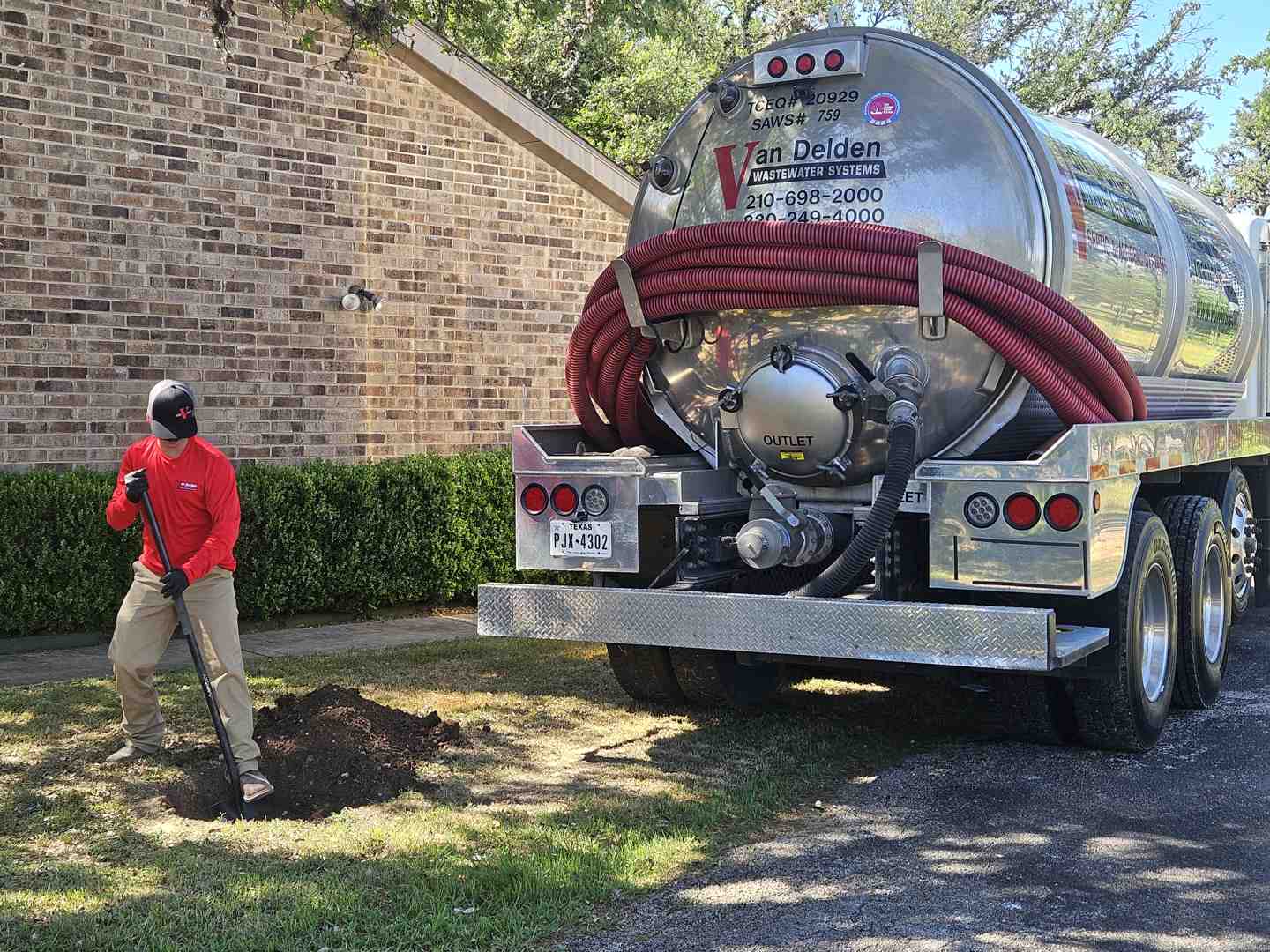Why Your Septic System Deserves Professional Attention
Septic cleaning services are essential for the 25 million U.S. homes with onsite wastewater systems. As a homeowner with a septic system, you are the manager of your own small wastewater treatment plant. This responsibility is straightforward with a basic understanding and professional support.
Your septic tank separates wastewater into three layers: sludge (solids) at the bottom, scum (oils and grease) at the top, and a middle layer of clarified water that flows to a drain field. Without regular cleaning, the sludge and scum layers build up, clog your system, and cause expensive failures.
Here’s a quick overview of professional septic cleaning:
- What it includes: Complete removal of sludge and scum, a basic system inspection, and proper disposal of waste at a licensed facility.
- When to call: The EPA recommends service every 3-5 years. You should also call if you notice foul odors, slow drains, sewage backups, or pooling water in your yard.
- What it costs: Pricing depends on tank size and accessibility. Scheduled maintenance is far more affordable than emergency services or system replacement, which can cost over $10,000.
Regular maintenance protects your property value, prevents health hazards, and saves you money.
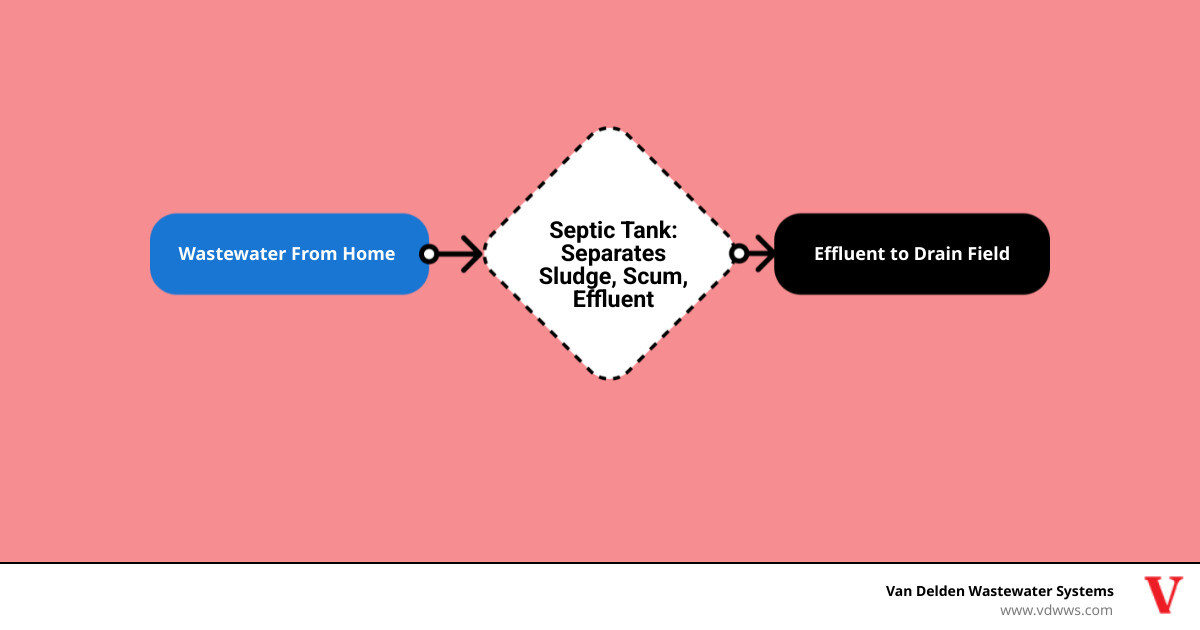
Why Regular Septic Maintenance is Non-Negotiable
Your septic system works tirelessly, but it needs professional care to protect your home and family. Just as you wouldn't skip oil changes for your car, regular septic cleaning services are non-negotiable for protecting one of your home's most critical assets.
A well-maintained system protects your property value and prevents messy, expensive problems that can deter future buyers. More importantly, it safeguards your family’s health by properly containing and treating harmful bacteria and pathogens. Routine maintenance is a small investment compared to the cost of emergency repairs or a full system replacement.
For more insights on recognizing when your septic system needs attention, check out our guide on Top 3 Signs You Should Clean Your Septic Tank Right Now.
The Benefits of Routine Septic Cleaning Services
Regular septic cleaning services offer significant benefits. System longevity is a primary advantage; removing sludge and scum buildup can help your system last for decades. This also promotes efficient operation, allowing beneficial bacteria to break down waste effectively. Perhaps the most immediate benefits are peace of mind and avoiding backups. You can rest easy knowing you're protected from mysterious odors, slow drains, and the messy, hazardous experience of sewage backing up into your home.
To dig deeper into why this routine care is so crucial, read our detailed article: Why You Should Have Your Septic Tank Cleaned - Part 1.
Consequences of Neglect
Ignoring your septic system will eventually lead to major problems. The most severe consequences of skipping septic cleaning services include:
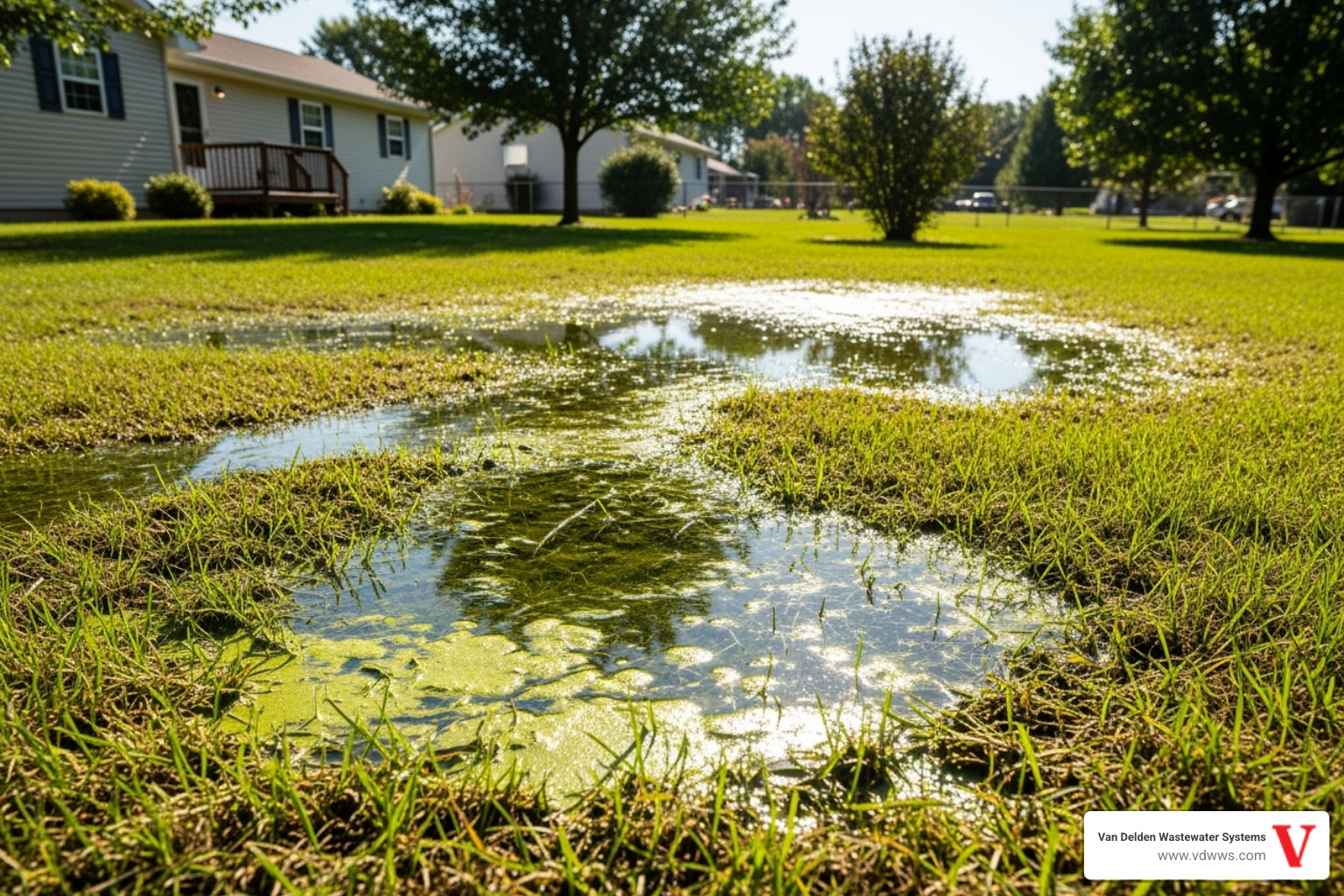
- System Failure: An overfull tank can cause raw sewage to back up into your home's drains and toilets.
- Clogged Drain Fields: Solids escaping the tank can plug the underground pipes, causing the system to fail and creating soggy, smelly patches in your yard.
- Contaminated Groundwater: Leaking sewage can pollute drinking water wells with harmful bacteria and viruses.
- Expensive Replacement: A complete system failure often requires a full replacement, a major excavation project that can cost tens of thousands of dollars.
- Legal Liability: You could face fines and legal action if your failing system contaminates neighboring properties or local water sources.
For more on the risks of neglecting your septic system, please refer to: Why You Should Have Your Septic Tank Cleaned - Part 2.
Environmental Impacts of a Poorly Maintained System
A failing septic system harms more than just your property. Groundwater pollution is a serious risk, as untreated sewage can contaminate the underground aquifers that supply drinking water to your community. Surface water contamination occurs when leaks run into streams and lakes, leading to algae blooms that kill fish and make water unsafe for recreation. These conditions can also contribute to the spread of disease and cause significant harm to local ecosystems. Proper septic maintenance is a critical part of being a responsible steward of the Texas environment.
For comprehensive guidance on caring for your septic system and its environmental role, consult the EPA guidance on septic systems.
Key Indicators: When to Schedule a Cleaning
Your septic system will give you warning signs when it needs attention. Being able to recognize these indicators can help you schedule septic cleaning services before a minor issue becomes a major emergency.
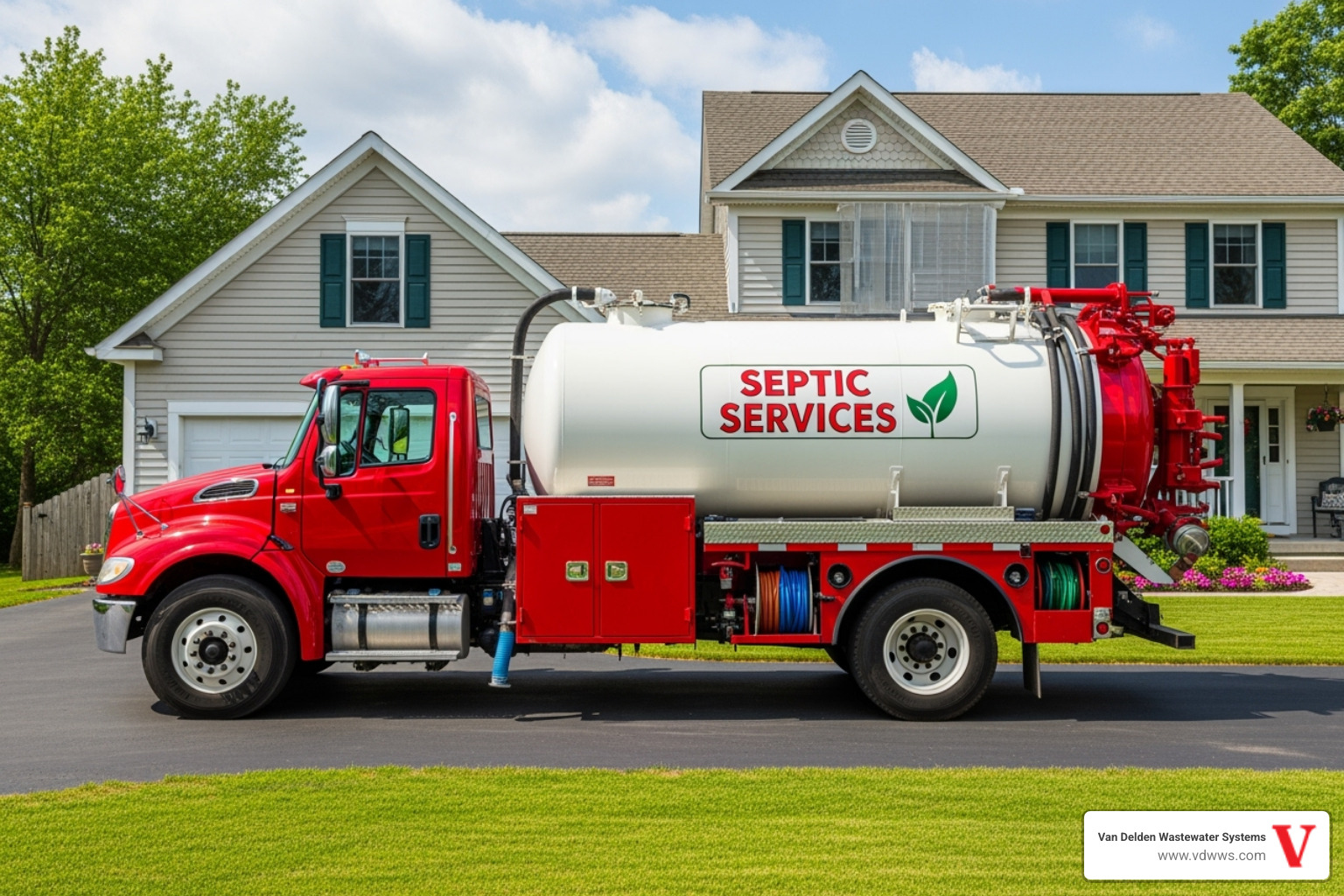
Watch for these common red flags:
- Foul Odors: A rotten-egg smell near your tank, drains, or in your yard is a classic sign of a full or failing system.
- Slow Drains: If sinks, showers, and toilets are draining slower than usual, your tank may be too full to accept more wastewater.
- Gurgling Sounds: Gurgling in your plumbing often indicates that the system is struggling to process waste.
- Sewage Backup: This is the most urgent sign. If raw sewage appears in your drains, your tank has reached its limit and needs immediate service.
- Pooling Water: Soggy spots or standing water near your tank or drain field mean the system can no longer absorb liquid properly.
- Lush Grass Patches: Unusually green grass over your drain field is a sign that wastewater is leaking and over-fertilizing the area.
If you notice these signs, call for professional help promptly to avoid a costly emergency.
How Often Should My Septic Tank Be Pumped?
There is no single answer for every household; the ideal pumping schedule depends on your specific situation. Key factors include household size, tank size, and your family's water usage habits. Homes with garbage disposals or high water usage will require more frequent pumping.
The EPA's general guideline is every three to five years, but this can vary. A large family may need annual service, while a couple might go longer. Here is a helpful starting point based on our experience in the San Antonio area:
| Number of People in Household | Tank Size (Gallons) | Recommended Pumping Frequency |
|---|---|---|
| 1-2 | 1,000 | Every 3-5 years |
| 3-4 | 1,000 | Every 2-3 years |
| 5+ | 1,000 | Annually |
| 3-4 | 1,250 | Every 3-4 years |
| 5+ | 1,250 | Every 1-2 years |
| Larger/Commercial | 1,500+ | Varies, often annually |
The best way to determine your schedule is with a professional inspection. We can assess your system and usage to recommend a frequency that works for your home in Boerne, Helotes, or the surrounding communities.
For a deeper dive into determining your perfect pumping schedule, check out our detailed guide: How Often Should My Septic Tank Be Cleaned?.
What to Expect from Professional Septic Cleaning Services
When you call us for septic cleaning services, you're getting nearly 90 years of family-owned expertise. Our background-checked, non-commissioned technicians are focused on educating you and doing the job right.
We begin by locating your septic tank and uncovering the access lids. The core of the service is using our specialized pump trucks to thoroughly remove all contents: the liquid wastewater, the floating scum layer, and the heavy bottom sludge. While pumping, we perform a visual inspection of your tank's interior, looking for cracks, blockages, or other potential issues. All waste is then transported to a licensed facility for safe and legal processing.
We pride ourselves on transparency, providing detailed service forms and photo documentation for your records. Our technicians will explain their findings and answer all your questions, empowering you to better maintain your system.
For a deeper dive into our comprehensive approach, visit our dedicated service page: Septic Tank Cleaning.
The Cleaning Process Step-by-Step
Here’s what you can expect when our team arrives:
- Initial Assessment: We'll discuss any issues you've noticed and locate your tank's access points.
- Uncovering the Tank: We safely uncover and open the tank lids, preparing for service.
- Pumping the Tank: Our powerful vacuum trucks remove all liquid, scum, and sludge.
- Cleaning and Inspection: We clean any stubborn residue from the tank walls and conduct a visual inspection of the tank, baffles, and pipes.
- Securing and Cleanup: We securely close the tank lids and clean up the work area.
- Proper Waste Disposal: All waste is transported to a licensed treatment facility.
- Customer Education: We provide a detailed service report with photos, explain our findings, and offer maintenance tips.
Factors Influencing the Cost of Septic Cleaning Services
The cost of septic cleaning services depends on several factors:
- Tank Size: Larger tanks require more time and resources to pump.
- Accessibility: Tanks that are buried deep or are hard to reach may require extra labor for digging.
- Location: Disposal fees and labor costs can vary by region.
- Tank Condition: A tank with excessive sludge buildup may require more time to clean thoroughly.
- Disposal Fees: A significant portion of the cost goes toward the safe and legal disposal of waste.
- Emergency Service: After-hours or emergency calls typically cost more than scheduled maintenance.
Regular maintenance is a smart investment that costs significantly less than emergency repairs.
For more insights into septic system economics, explore our blog post: How Much Will It Cost to Clean My Septic Tank?
How to Find a Reputable Provider
Choosing the right company for septic cleaning services is crucial. Look for these signs of a trustworthy provider:
- Licensing and Insurance: This is non-negotiable and protects you from liability.
- Experience: A long history, like our family's 90 years in the business, indicates deep expertise.
- Customer Reviews: Positive testimonials and references speak to a company's quality of work.
- Transparent Pricing: A reputable company provides clear estimates without hidden fees.
- Professional Equipment: Modern equipment ensures an efficient and thorough job.
- Customer Education: Technicians should explain the process and provide documentation.
- Reliability: Look for a company that respects your time by being prompt and professional.
For more guidance on selecting a quality septic company, check out our comprehensive guide: How to Choose a Quality Septic Company.
Proactive Care: Your Role in Septic System Health
While professional septic cleaning services are essential, your daily habits play a huge role in your system's health. Most septic failures are caused by what goes down the drain, which means you have significant control over your system's longevity.
Smart choices about water use and waste disposal protect your investment and keep the beneficial bacteria in your tank healthy. Key areas for proactive care include:
- Water Conservation: Reducing water use lessens the load on your system. Fix leaks, take shorter showers, and spread out laundry loads.
- Proper Waste Disposal: Your septic system is designed for human waste and toilet paper only. Flushing other items can poison the system's bacteria or cause clogs.
- Avoiding Harsh Chemicals: Bleach and chemical drain cleaners can kill the microorganisms that break down waste.
- Protecting Your Drain Field: This area is critical for final water treatment and must be protected from damage.
For seasonal reminders and helpful tips on keeping your system in top shape, check out: Don't Forget to Spring Clean Your Septic Tank.
What Not to Flush
The golden rule of septic systems is simple: only flush human waste and toilet paper. Flushing anything else can lead to clogs and system failure. Keep these items out of your drains and toilets:
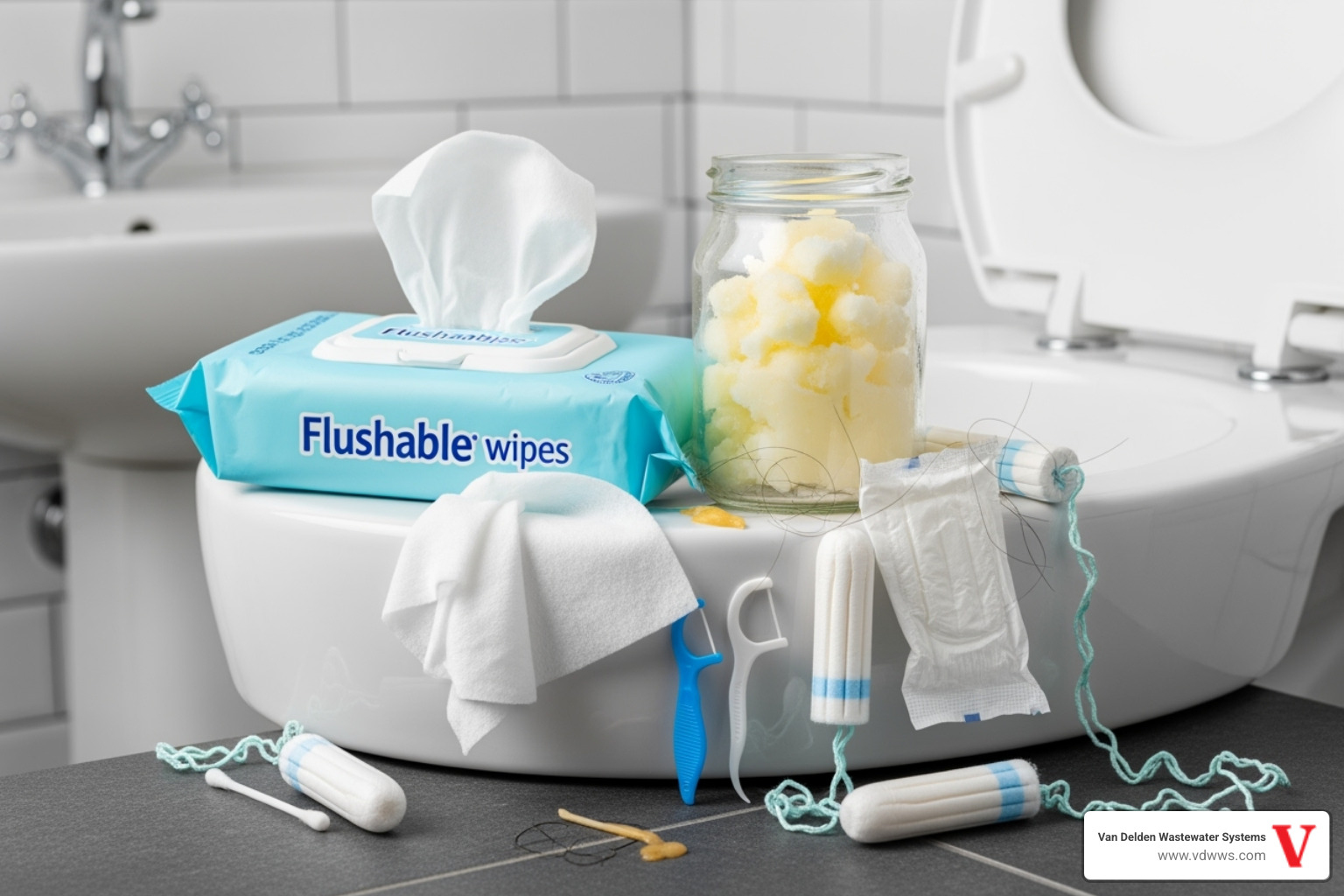
- "Flushable" Wipes: These do not break down and are a primary cause of clogs.
- Feminine Hygiene Products: Tampons and pads are designed to expand and will block pipes.
- Grease and Cooking Oil: These solidify in pipes, causing severe blockages.
- Paper Towels & Dental Floss: Neither biodegrades properly in a septic tank.
- Chemicals & Medications: Harsh chemicals, paint, and old medications can kill essential bacteria and contaminate groundwater.
- Diapers, Condoms, & Cotton Products: These items are not biodegradable and will accumulate in your tank.
- Coffee Grounds: These add unnecessary solids to your tank, increasing sludge buildup.
Protecting Your Drain Field
Your drain field is the most expensive part of your system to replace, so protecting it is vital. Follow these simple rules:
- No Heavy Vehicles: Do not drive or park cars, trucks, or heavy equipment over the drain field. The weight compacts the soil and can crack pipes.
- Plant Carefully: Grass is the ideal cover. Avoid planting trees or shrubs nearby, as their deep roots can invade and clog pipes.
- Manage Water: Divert rainwater from gutters and downspouts away from the drain field to prevent the ground from becoming oversaturated.
- Do Not Build: Never build patios, sheds, pools, or other structures over your drain field. This prevents access for repairs and interferes with the treatment process.
For more insights on how your landscaping and irrigation choices affect your septic system, read our article: Septic Tank Cleaning and Sprinkler Systems.
Frequently Asked Questions about Septic System Maintenance
Septic systems can be a mystery since they're buried underground. We've answered thousands of questions about septic cleaning services over our decades in business. Here are some of the most common ones.
How long does a septic tank cleaning take?
A typical residential septic tank cleaning is a surprisingly quick process, usually taking 1 to 2 hours. The exact time can vary depending on a few factors. Larger tanks take longer to pump than smaller ones. Accessibility is also key; tanks with surface risers are faster to service than those with buried lids that require digging. Finally, a tank that hasn't been serviced in many years may have hardened sludge that requires extra time to break up and remove completely.
Can I use septic tank additives?
We generally do not recommend septic tank additives. A healthy septic tank contains a natural ecosystem of bacteria that effectively breaks down waste on its own. The effectiveness of commercial additives is not scientifically proven, and the EPA does not recommend their use. In fact, some chemical additives can harm the natural bacteria or cause solids to flush into the drain field, leading to clogs and expensive damage. Regular septic cleaning services and proper household habits are the safest and most effective way to maintain your system.
What's the difference between septic cleaning and pumping?
While often used interchangeably, there is a key difference. Septic pumping refers to the basic act of removing the liquid and solids from your tank with a vacuum truck. Septic cleaning is a more comprehensive service that includes pumping but goes further. During a cleaning, our technicians also take care to remove stubborn, caked-on residue from the tank walls to ensure it is as empty as possible. A cleaning service also includes a basic visual inspection of your tank's interior components, such as the baffles and pipes, to assess the overall health of your system. When you schedule our septic cleaning services, you are getting this more thorough, diagnostic approach.
Conclusion
This guide highlights why professional septic cleaning services are a crucial part of responsible homeownership. Just like regular oil changes for your car, septic maintenance is a proactive investment that protects a vital system. Understanding the warning signs of a problem and practicing good habits puts you in control, helping you avoid messy backups and costly repairs.
Proactive maintenance is the best way to ensure your system's longevity and protect your property, your family's health, and our shared Texas environment. These disasters are almost always preventable with regular, professional care.
When you're ready for professional septic cleaning services, you can trust Van Delden Wastewater Systems. Since 1937, our family-owned business has provided honest, high-quality service to families throughout the San Antonio area. Our background-checked, non-commissioned technicians are focused on educating you and providing superior work, complete with detailed service forms and photos.
Your septic system works hard for you 24/7. Return the favor with the professional care it deserves. Don't wait for an emergency—take a proactive step for your home's health today.
Customer Reviews
Peter was personable, professional and thorough. Highly recommend Van Delden. You might be able to find a cheaper company but not better!
On time. 100% professional, knowledgeable, and courteous. Very helpful and straightforward. That is the bar all businesses should strive for.
It has been a pleasure working with your company. Not only did y’all communicate very well but your workers were always polite! Thank you!
“I thank Van Delden for such prompt service. Honest people are hard to come by these days. I will certainly recommend Van Delden to anyone! Jesse is an upstanding young man and very nice to talk to. I thank everyone at Van Delden for taking such good care of me.”
This is just a note to thank you for explaining the problem with my system. You didn’t have to be so kind and I appreciate your good business ethics and time spent. In the future you will have mine in return!



